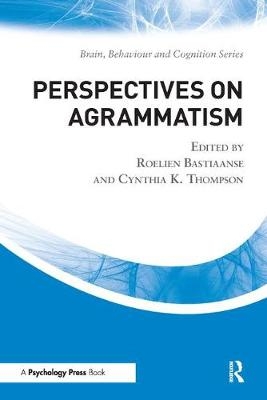
Perspectives on Agrammatism
Psychology Press Ltd (Verlag)
978-1-138-11845-4 (ISBN)
Agrammatic aphasia (agrammatism), resulting from brain damage to regions of the brain involved in language processing, affects grammatical aspects of language. Therefore, research examining language breakdown (and recovery) patterns in agrammatism is of great interest and importance to linguists, neurolinguists, neuropsychologists, neurologists, psycholinguists and speech and language pathologists from all over the world. Research in agrammatism, studied across languages and from different perspectives, provides information about the grammatical structures that are affected by brain damage, their nature, and how language (and the brain) recovers from brain damage.
The chapters in this book focus on the symptoms that arise in agrammatic aphasia at the lexical, morphological and sentence level and address these impairments from neurolinguistic, neuropsychological and neurological perspectives. Special attention is given to methods for assessment and treatment of agrammatism and to the neurobiological changes that can result from the treatments.
Perspectives on Agrammatism provides an up-to-date overview of research that has been done over the past two decades. With contributions from the most influential aphasiologists from Europe and the United States, it provides an indispensable reference for students and academics in the field of language disorders.
Roelien Bastiaanse is a Professor in Neurolinguistics at the University Groningen. Her research focuses on the cross-linguistic aspects of agrammatic aphasia and the analysis of spontaneous speech, both with special emphasis on the production of verbs. The results have been used to develop tests and treatment programmes for aphasia in several languages. Cynthia K. Thompson is Ralph and Jean Sundin Professor of Communication Sciences and Disorders at Northwestern University. The primary goals of her research are to examine language breakdown and recovery patterns in aphasia and to explore the neurocognitive mechanisms of normal, disordered and recovered language processing.
C. Thompson, R. Bastiaanse, Introduction to Agrammatism. R. Bastiaanse, R. Jonkers, Linguistic Accounts of Agrammatic Aphasia. D. Caplan, Resource Reduction Accounts of Syntactically Based Comprehension Disorders. S. Cappa, Neurological Accounts of Agrammatism. C. Luzzatti, S. Mondini, C. Semenza, Lexical Impairments. C. Thompson, A. Kielar, S. Fix, Morphological Aspects of Agrammatic Aphasia. J. Niemi, M. Laine, Lexical, Inflectional, and Clitic Morphology: Evidence from an Agrammatic Aphasic Individual. R. De Bleser, F. Burchert, P. Holzinger, C. Weidlich, Agrammatism at the Sentence Level: The Role of Morphology and Prosody. J. Webster, D. Howard, Assessment of Agrammatic Language. Y. Faroqi-Shah, C. Thompson, Approaches to Treatment of Agrammatism.
| Erscheinungsdatum | 04.07.2017 |
|---|---|
| Reihe/Serie | Brain, Behaviour and Cognition |
| Zusatzinfo | 7 Tables, black and white; 23 Illustrations, black and white |
| Verlagsort | Hove |
| Sprache | englisch |
| Maße | 156 x 234 mm |
| Gewicht | 453 g |
| Themenwelt | Geisteswissenschaften ► Psychologie ► Allgemeine Psychologie |
| Geisteswissenschaften ► Psychologie ► Verhaltenstherapie | |
| Geisteswissenschaften ► Sprach- / Literaturwissenschaft ► Sprachwissenschaft | |
| Medizin / Pharmazie ► Gesundheitsfachberufe ► Logopädie | |
| ISBN-10 | 1-138-11845-1 / 1138118451 |
| ISBN-13 | 978-1-138-11845-4 / 9781138118454 |
| Zustand | Neuware |
| Haben Sie eine Frage zum Produkt? |
aus dem Bereich


